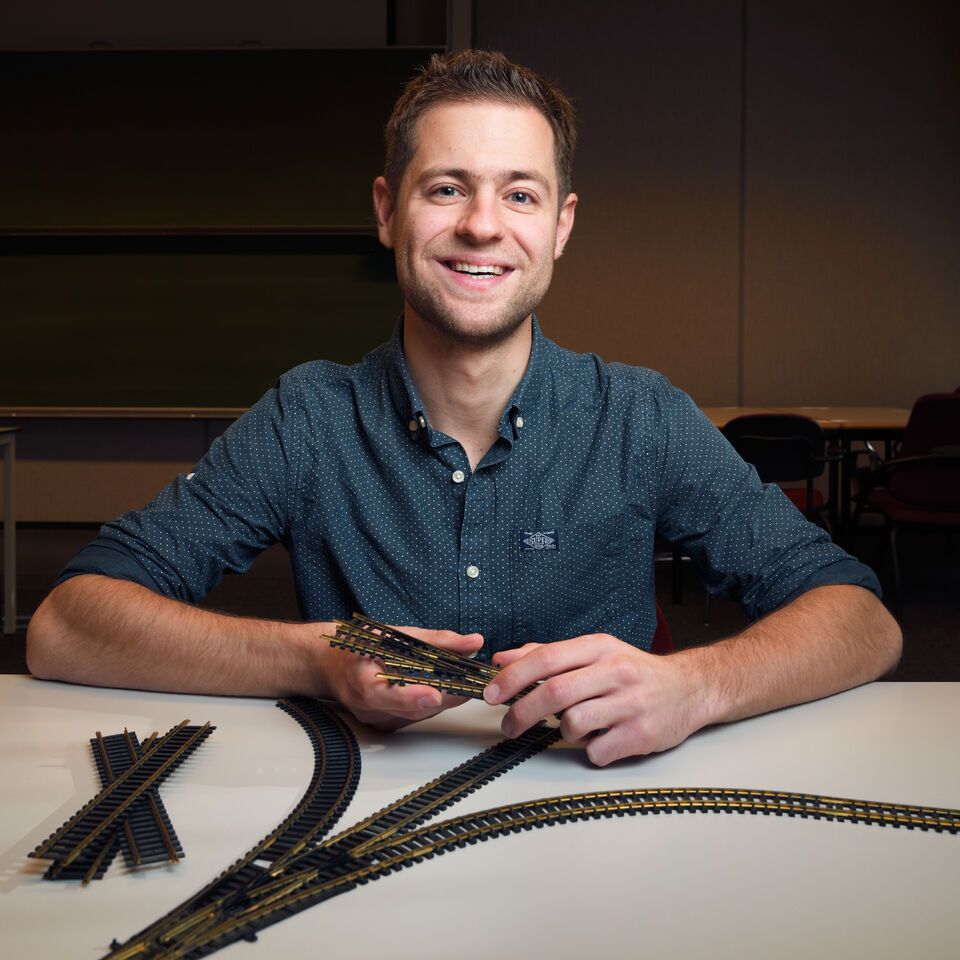Home Stretch | On track together
ProRail outsources the maintenance of the Dutch rail network to a number of large contractors, each responsible for their own region. PhD candidate Loe Schlicher proved that it is cheaper to have these maintenance companies share machines and spare parts. “This enables all parties to save money, but as yet they are very reluctant to enter into cooperative relations.”
Rail maintenance requires a number of expensive, specialized pieces of equipment, tells Loe Schlicher, who recently gained his doctorate in the Operations, Planning, Accounting, and Control group of the Department of Industrial Engineering and Innovation Sciences (IE&IS). “Take the tamping machine, that's a kind of train that can push stones under the rail when the track has become unstable. Each of the contractors needs to have a machine like this, but in practice they are seldom used, and even then for only a few hours. Nonetheless, tamping machines are regularly being serviced, which creates the additional risk of the machine being unavailable right when you need it.”
Cost saving
It is easy enough to see that it would be cheaper if tamping machines were shared by the contractors involved. But if you want to encourage them to do this, you need to think carefully about how you plan to distribute the cost saving among them, Schlicher stresses. “If it doesn't benefit every contractor – we are talking about independent, commercial businesses – you won't get this to fly.” And actually it is even more complex than that, he explains. “Nor will it work if any sub-group of contractors exists for which it is beneficial to cooperate outside the wider cooperation in that case, this smaller group will split off.”
It was up to game theorist Schlicher to prove there were indeed ways of pooling expensive maintenance equipment so that all parties would be better off. Fortunately for the commissioning party ProRail, he did just that, by proving there is generally a solution. “What I found completely counterintuitive, however, was that via the distribution model you have to reward the partners not only for providing the equipment, but also for using it – you have to reward contractors who offer their competitors the opportunity to use their equipment gainfully. This might be, for example, because in their region a great deal of rail maintenance needs to be carried out.”
Stock
Subsequently, the PhD candidate shifted his focus to a related problem: the sharing of a stock of spare parts. “At present this is done only occasionally on an ad hoc basis, which is actually really bad, because it is not taken into account in the restocking.” Here, too, cooperation would be beneficial, says Schlicher, but only under certain conditions. The most important of which is that you don't treat all parts of the rail network equally.
“If rail traffic comes to a standstill in the Amsterdam area, the consequences are far greater than if it happens near Maastricht. If there is only one piece of a certain spare part in stock, it may be more favorable to refuse the request from Maastricht, in order to avoid the risk of Amsterdam needing it and not getting it.”
Sensitive
Before ProRail has persuaded its contractors to adopt such a far-reaching form of cooperation, a whole fleet of trains will have to ride the rails – or to be more accurate, will have to come to a halt, Schlicher fears. “The reluctance among contractors is still considerable. It's mainly the prospect of having to share sensitive information that scares them. A solution would be to establish a trusted third party that handles this information confidentially.” He hopes that ProRail comes to realize the importance of this, certainly now that, in his view, more and more rail components are nearing the end of their operational life. “What ProRail is already starting to do, which is very good, is to purchase spare parts that its contractors consider too expensive to keep in stock. Because there is no way they can let rail traffic to come to a prolonged standstill because a part has to ordered.”


Discussion